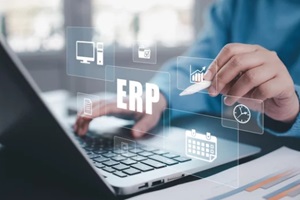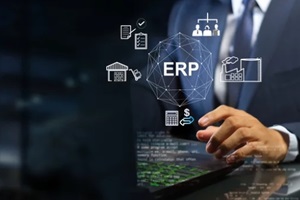A custom ERP system is fundamental in improving organizational efficiency and helping your business get and maintain a competitive edge. Custom ERP software development creates a solution specifically built for your business, addressing your needs and distinct challenges.
This article outlines the essential steps for building a custom ERP system that perfectly aligns with your current and future business goals.
Comprehending ERP Software
 ERP (Enterprise Resource Planning) software incorporates and manages multiple core business processes across your organization, providing a unified system for various functions.
ERP (Enterprise Resource Planning) software incorporates and manages multiple core business processes across your organization, providing a unified system for various functions.
Typical ERP system modules include finances, HR, and supply chain management, each essential for improving your day-to-day operations and helping you make better decisions.
Custom ERP solutions offer distinct advantages over off-the-shelf options. Included in these benefits are custom functionality that fits your specific needs, scalability for business growth, and straightforward integration with your current systems.
Phase 1: Initial Planning
Conducting a complete needs assessment establishes a strong foundation for a successful ERP implementation. Cognizance of your business requirements helps identify gaps and opportunities the ERP system should address.
Engaging all relevant parties in this process gathers different perspectives, which can lead to a more complete knowledge of your needs. You must also set clear, trackable goals that align with your business strategy, creating a system that drives growth and efficiency.
Accurately estimating costs and allocating resources is essential here. Proper budgeting and resource planning establishes that the project has the necessary funding and manpower, setting the stage for a successful implementation.
Phase 2: Requirement Gathering
Mapping your existing business processes is important for identifying inefficiencies and bottlenecks. This analysis helps uncover areas that could benefit from improvement and automation, setting the stage for a more streamlined operation.
Following this analysis, detailed requirement specifications are created. Precision-documenting these requirements guides the development process to ensure that the ERP system addresses your specific needs.
Prioritizing them based on how they impact business operations can help focus resources on the areas that matter most.
Phase 3: Selecting a Development Approach
Choosing between developing a solution in-house and outsourcing depends on your organization’s specific needs and requirements. In-house development offers greater control and closer alignment with your business culture.
Still, it may require more resources and expertise. Outsourcing allows access to specialized skills and potentially lower costs, though it might limit control over the project.
Selecting the right technology stack involves evaluating options based on your overall business goals; scalability, cybersecurity, and the ability to work with existing systems should guide your decision.
Phase 4: Design and Prototyping
Creating a high-level system architecture involves outlining the overall structure of the ERP system. Modularity and strong integration capabilities are essential to accommodate future changes and seamless interaction between modules.
Designing intuitive and user-friendly interfaces focuses on making your solution easy to maneuver. Incorporating user feedback and conducting usability testing throughout the design process helps create an interface that meets the needs of those who use it daily.
Phase 5: Development
 Adopting an agile development methodology lets your team work in short, iterative cycles, making it easier to adapt to changes and improve the system continuously as new needs arise.
Adopting an agile development methodology lets your team work in short, iterative cycles, making it easier to adapt to changes and improve the system continuously as new needs arise.
Building individual modules according to specific requirements assures that each component functions effectively. Focusing on seamless integration and interoperability between modules creates a cohesive system where all parts work together smoothly. Exhaustive testing at every stage is essential to handle possible problems early.
Phase 6: Implementation
The data migration process entails carefully transmitting data from your current system to the new system. Maintaining accuracy and integrity throughout this process is essential to prevent disruptions and make sure the system functions as intended.
Thorough training for end-users helps them become familiar with the new system. Providing clear, accessible instruction increases comfort and confidence, which maximizes adoption and minimizes resistance to change.
Final preparations for the deployment or go-live phase include conducting thorough tests and validations. These last checks confirm that everything works correctly, reducing the risk of issues during the ERP system’s official launch.
Phase 7: Post-Implementation
Establishing a strong, reliable support system after implementation helps address any issues. Ongoing monitoring helps you quickly locate and fix problems, keeping the system running smoothly.
Collecting user feedback provides important insights for continuous improvement. Regular updates and enhancements align the ERP system with changing business needs, improving its performance over time.
Challenges and Considerations
- Change Management: Resistance to change can be a challenge. Engaging all parties early and offering training helps to promote engagement and acceptance.
- Data Security: Protecting sensitive information is essential. Implementing strong security measures can mitigate potential risks.
- Cost Overruns: Staying within budget requires careful planning. Regular budget reviews help keep expenses in check and avoid financial surprises.
Real-World Examples of ERP Software
In a recent example, LG Electronics utilized an Oracle ERP system customized to its needs, which provided regional branches with more control and flexibility over their processes. Another notable case involves Starbucks, which uses Oracle ERP to streamline its global supply chain and manage financials across thousands of locations.
Both examples highlight the importance of aligning ERP systems with business objectives and show how custom solutions can drive efficiency and scalability.
Future Trends in ERP Software
 AI integration in ERP can automate tasks and provide predictive analytics to improve strategic decision-making. IoT integration brings real-time data collection, enhancing accuracy and more streamlined business processes.
AI integration in ERP can automate tasks and provide predictive analytics to improve strategic decision-making. IoT integration brings real-time data collection, enhancing accuracy and more streamlined business processes.
Cloud-based ERP solutions offer the flexibility and scalability needed to adapt quickly, reduce IT costs, and allow easy access from any location.
Leading Custom ERP Software Solutions
Building a custom ERP system involves a well-planned roadmap, from initial needs assessment to post-implementation support. This process creates a solution customized to your business, improving organizational efficiency and operational scalability.
For further reading, consider additional articles, whitepapers, and guides on ERP operations and development. For more personalized assistance, consider contacting Orases to schedule a consultation online or call 1.301.756.5527 today to get started on creating a custom ERP solution for your organization.






